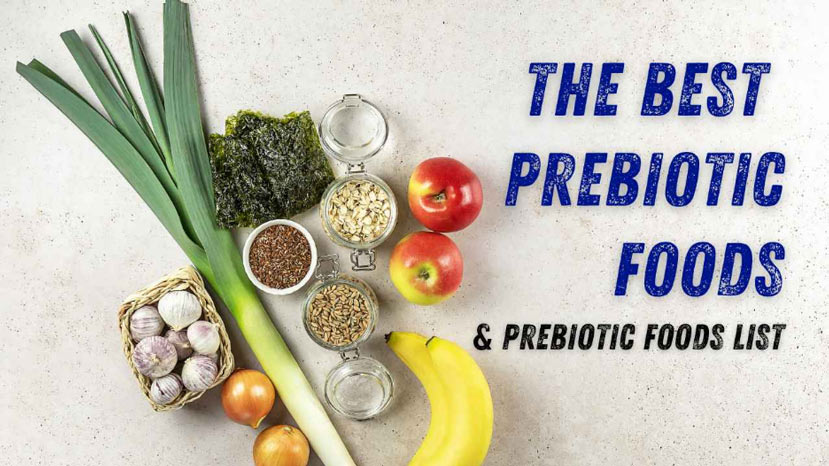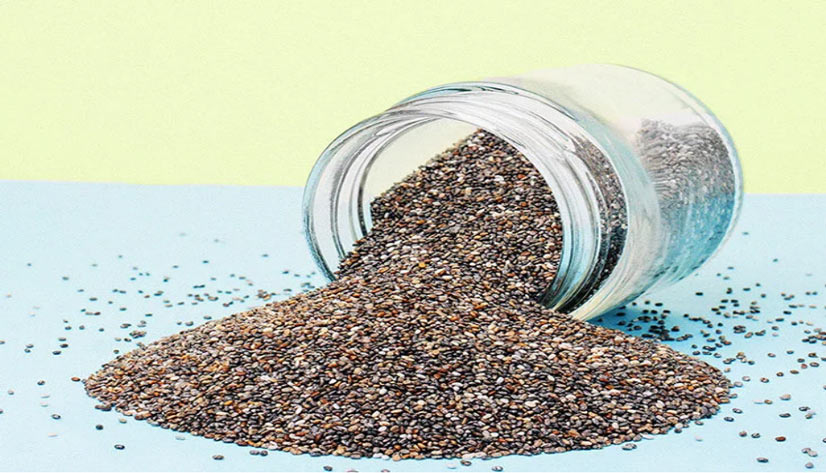Are you looking for the best prebiotic foods to add to your diet? Prebiotics are an essential part of a healthy gut and aid in digestion. They also help your digestive system absorb health-promoting compounds, minerals, and vitamins while helping regulate the immune system.
In this blog post we’ll discuss why prebiotics are important for overall health and provide tips on which foods contain the most beneficial prebiotics so that you can start incorporating them into your diet!
What are prebiotics, and why you should include them in your diet
Prebiotics are a type of fiber that helps to feed and nourish the good bacteria in your gut. By doing this, they help support digestion and absorption of essential vitamins, minerals, and other compounds while also aiding in regulating your immune system. This makes prebiotics an important part of a healthy diet.
Foods that contain beneficial prebiotics: You can add many foods to your diet that contain beneficial prebiotics. Some examples include high-fiber vegetables like asparagus, onions, garlic, artichokes, bananas, chicory root, oats, and legumes such as kidney beans and lentils. You can also supplement with prebiotic yogurts or drinks containing live cultures, such as kefir.
The Best Prebiotic Foods You Should Eat
Chicory root:
Chicory root is an excellent source of prebiotics due to its high fiber content. It helps support the growth of beneficial bacteria in the gut, which can increase nutrient absorption and improve digestion. This makes it a great addition to any diet!
Chicory root also contains antioxidants that help reduce inflammation and vitamins and minerals like calcium, magnesium, and potassium. Additionally, research suggests that chicory root may positively affect cholesterol levels and blood glucose control. It’s best consumed cooked or roasted for maximum benefit.
Asparagus:
Asparagus is another great prebiotic food due to its high fiber content and various vitamins and minerals such as vitamins A, C, E, and K. Eating asparagus regularly helps to nourish the good bacteria in your gut, which can help improve digestion and absorption of essential vitamins and minerals.
Additionally, research has shown that asparagus can help reduce inflammation and protect against certain chronic diseases. It’s best enjoyed cooked or steamed for maximum benefit!
Onions:
Onions are a great source of prebiotics that help feed the beneficial bacteria in your gut while providing essential vitamins and minerals such as vitamin C, potassium, calcium, magnesium, zinc, and iron.
Eating onions regularly may reduce inflammation, improve heart health, lower cholesterol levels, and boost immune system function. It’s best enjoyed cooked or sautéed for maximum benefit.
Garlic:
Garlic is an excellent source of prebiotics due to its high fiber content and various vitamins, minerals, and antioxidants. Eating garlic regularly can help improve digestion, reduce inflammation, and boost your immune system. Additionally, research suggests garlic may reduce the risk of chronic diseases such as heart disease and cancer. It’s best enjoyed cooked or roasted for maximum benefit!
Bananas:
Bananas are a great source of prebiotics due to their high fiber content and various vitamins and minerals such as vitamin C, potassium, magnesium, copper, manganese, iron, folate, and B vitamins.
Eating bananas regularly can help promote the growth of beneficial bacteria in your gut, improving digestion and absorption of essential nutrients. Additionally, bananas contain antioxidants that can reduce inflammation and protect against certain chronic diseases. It’s best enjoyed fresh or frozen for maximum benefit!
Oats:
Oats are an excellent source of prebiotics due to their high fiber content and various vitamins, minerals, and antioxidants. Eating oats regularly can help improve digestion, reduce inflammation, and boost your immune system. Additionally, research suggests that oats may reduce the risk of chronic diseases such as heart disease and cancer. It’s best enjoyed cooked or baked for maximum benefit!
Legumes:
Legumes such as kidney beans and lentils are excellent sources of prebiotics due to their high fiber content and various vitamins, minerals, and antioxidants. Eating legumes regularly can help promote the growth of beneficial bacteria in your gut, improving digestion and absorption of essential nutrients. Additionally, legumes contain antioxidants that can reduce inflammation and protect against certain chronic diseases. It’s best enjoyed cooked or boiled for maximum benefit!
Kefir:
Kefir is a fermented drink made from milk or coconut water that contains beneficial probiotics and prebiotics. It helps improve digestion, reduce inflammation, strengthen your immune system, and promote the growth of beneficial bacteria in your gut. Additionally, research suggests that kefir may reduce the risk of chronic diseases such as heart disease and cancer. It’s best enjoyed cold for maximum benefit!
Probiotic Yogurt:
Probiotic yogurt contains beneficial probiotics and prebiotics that can help improve digestion, reduce inflammation, boost your immune system, and promote the growth of beneficial bacteria in your gut. Additionally, research suggests that probiotic yogurt may reduce the risk of chronic diseases such as heart disease and cancer. It’s best enjoyed cold for maximum benefit!
Artichokes:
Artichokes are a great source of prebiotics due to their high fiber content and various vitamins, minerals, and antioxidants. Eating artichokes regularly can help improve digestion, reduce inflammation, and boost your immune system. Additionally, research suggests that artichokes may reduce the risk of chronic diseases such as heart disease and cancer. It’s best enjoyed cooked or steamed for maximum benefit!
Jicama:
Jicama is a great source of prebiotics due to its high fiber content and various vitamins, minerals, and antioxidants. Eating jicama regularly can help promote the growth of beneficial bacteria in your gut, improving digestion and absorption of essential nutrients. Additionally, jicama contains antioxidants that can reduce inflammation and protect against certain chronic diseases. It’s best enjoyed raw for maximum benefit!
Beans:
Beans are an excellent source of prebiotics due to their high fiber content and various vitamins, minerals, and antioxidants. Eating beans regularly can help improve digestion, reduce inflammation, and boost your immune system. Additionally, research suggests that beans may reduce the risk of chronic diseases such as heart disease and cancer. It’s best enjoyed cooked or boiled for maximum benefit!
Chia Seeds:
Chia seeds are a great source of prebiotics due to their high fiber content and various vitamins, minerals, and antioxidants. Eating chia seeds regularly can help promote the growth of beneficial bacteria in your gut, improving digestion and absorption of essential nutrients. Additionally, chia seeds contain antioxidants that can reduce inflammation and protect against certain chronic diseases. It’s best enjoyed raw or soaked for maximum benefit!
FAQs
Q: What foods contain prebiotics?
A: The best sources of prebiotic fiber include onions, garlic, leeks, asparagus, bananas, oats, apples, barley, nuts, seeds, flaxseeds, and soybeans. Legumes such as chickpeas and lentils also provide prebiotic benefits. Other sources of prebiotic fiber include chicory root extract and Jerusalem artichoke root extract.
Q: Why are prebiotic foods important?
A: Prebiotic foods help nourish the beneficial bacteria in your gut, which helps maintain a healthy balance in your digestive system. They also help your body absorb vitamins and minerals more effectively, supporting immune health and overall wellness. Including prebiotics in your diet ensures you get all the nutrients needed for optimal health.
Q: How can I incorporate prebiotic foods into my diet?
A: Prebiotic foods are easy to incorporate into your diet. Start by adding small amounts of prebiotic-rich foods to meals and snacks. Add onions, garlic, leeks, or asparagus to salads or roasted vegetables. Incorporate bananas, oats, apples, and nuts into smoothies or oatmeal bowls. Consider swapping regular bread for rye bread with flaxseeds – this is a great way to add more prebiotics! You can also try taking a prebiotic supplement if you don’t get enough fiber from food sources.
Conclusion
Prebiotics are essential to a healthy diet and important for overall health. Prebiotic-rich foods in your meals and snacks can help support digestive health, regulate the immune system, and promote overall wellness. Remember to talk to your doctor if you have any questions or concerns about adding prebiotic foods to your diet.

Why You Should Eat Pomegranate: 10 Incredible Health Benefits
Jan 07, 2024

Why Kelp Deserves a Spot in Your Kitchen: Top 8 Health Benefits
Jan 08, 2024

Triple Therapy: An Effective Strategy in Controlling Severe Asthma.
Nov 06, 2023

Understanding Scalp Sensitivity
Dec 31, 2023

Comprehensive Guide to Carbohydrates
Jan 02, 2024

How Much Caffeine in Coffee
Dec 20, 2023

Best Healthy Late-Night Snacks
Nov 08, 2023

Best Prebiotic Foods
Dec 22, 2023





